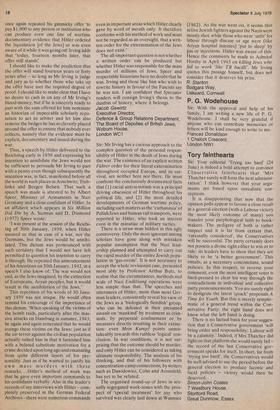Sir: Mr Irving has a curious approach to the complex
question of the personal responsibility of Hitler in the death of Jews during the war. The existence of an explicit written Fiihrer order for their literal extermination throughout occupied Europe, and its survival, are neither here nor there. He must confront the conclusively documented facts that (1) racial anti-semitism was a principal driving obsession of Hitler throughout his political life, and (2) the most detailed developments of German wartime policy, including such matters as the 'euthanasia' of Polish Jews and human rail transports, were reported to Hitler, who took an interest even in the minutiae of military tactics.
There is a straw-man hidden in this ugly controversy. Only the most ignorant among scholars have gone along with mistaken popular assumption that the Nazi leadership planned and attempted to carry out the rapid murder of the entire Jewish population in `gas-ovens'. It is not necessary to accept the whole revisionist case, presented most ably by Professor Arthur Butz, to realise that the circumstances, methods and scale of Nazi Endlosung operations were less simple than that. The speeches and utterances of Hitler, more than most German leaders, consistently reveal his view of the Jews as a 'biologically fiendish' group, who can be defeated in their presumed assault on 'mankind' by treatment as criminals, by perpetual confinement or by measures directly resulting in their extinction: even Mein Kampf points unmistakeably towards this ruthless 'logical' conclusion. In war conditions, it is not surprising that the outcome should be murder, and only Hitler can he considered as taking ultimate responsibility. The analysis of his thinking, and that of his followers with concentration-camp connections, by writers such as Dawidowicz, Cohn and Aronsfeld, has yet to be refuted.
The organised round-up of Jews in sexually segregated work-zones with the prospect of 'special treatment' for any who survived was clearly laid down at Wannsee (1942). As the war went on, it seems that active Jewish fighters against the Nazis were mostly shot, while those who were 'unfit' for labour through disease or age were (like Aryan hospital inmates) 'put to sleep' by gas or injections. Hitler was aware of this. Hence the comments he made to Admiral Horthy in April 1943 on killing Jews who fail to work 'like TB bacilli'. Mr Irving quotes this passage himself, but does not consider that it deserves his prize. R. Stanton Bodgara Way, Liskeard, Cornwall


































 Previous page
Previous page